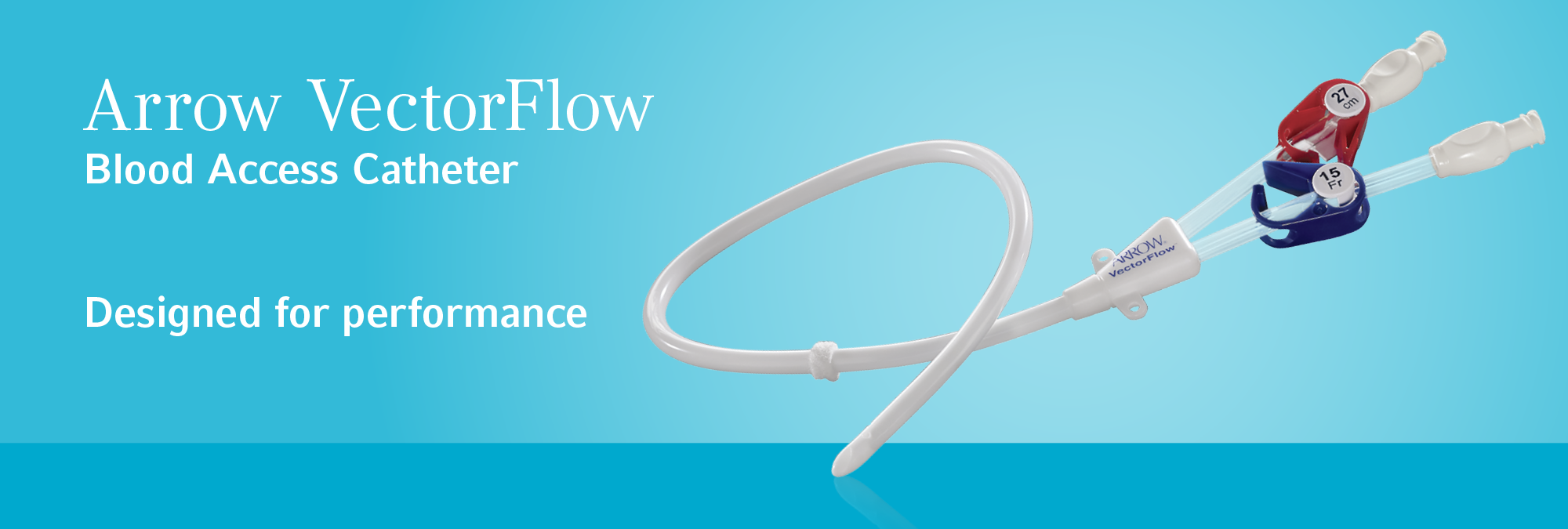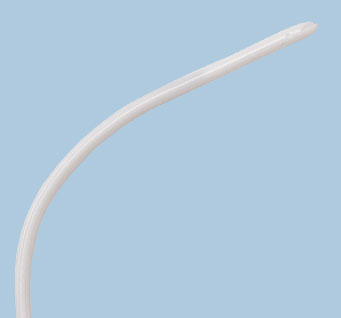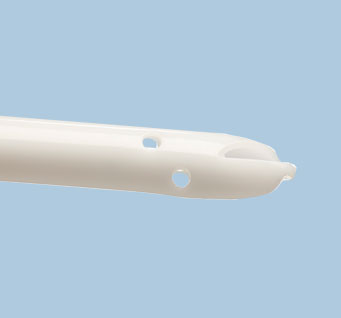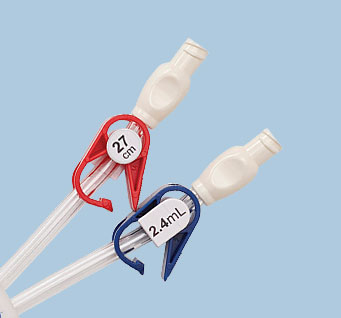Customer Support
Teleflex Medical Japan, Ltd.
Shinjuku NS Bldg. 5F 2-4-1, Nishi-shinjuku Tokyo, 163-0805 Japan Fax: 81-3-6632-3631 Customer Service: 0570-055-160 (Domestic calls only) Email Teleflex Medical Japan

ARROW VectorFlow Blood Access Catheter
Because in Blood Access catheters, the tip matters
The ARROW VectorFlow Catheter is a symmetrical-tip, tunneled hemodialysis catheter designed to provide sustained high flows,1 reduce loss of lock solution2 and reduce the risk of thrombus accumulation due to platelet activation resulting from shear stress.3 Available in both retrograde and antegrade insertion platforms, the catheter is designed with an innovative tip that allows placement flexibility with minimal impact on recirculation rates.2
ARROW VectorFlow Blood Access Catheter Animation
Designed for performance
- Catheter tip designed to optimize catheter flow and minimize recirculation5
- Sidehole design engineered to reduce the loss of lock solution,2 a contributing factor in reducing the risk of thrombus adherence5
-
Catheter tip designed to reduce the risk of platelet damage caused
by shear stress,4
potentially helping to reduce the risk of thrombus accumulation on
catheter surface3

CATHETER INSERTION
No stylet needed for insertion
Next

SIDEHOLE DESIGN
Engineered to optimize catheter flow4 and reduce loss of lock solution2, a contributing factor in reducing the risk of thrombus adherence5
Next

MINIMAL RECIRCULATION
Catheter tip designed to deflect venous blood away from the catheter, in a direction opposite to blood entering the catheter in arterial lumen
Next

SYMMETRICAL TIP
- Designed for ease of placement over guidewire
- Allows reversal of lumens without increase in recirculation2
- Catheter tip designed to reduce the risk of platelet damage caused by shear stress,4 potentially helping to reduce the risk of thrombus accumulation on catheter surface3
Next

EASY TO READ CATHETER
Length and volume information on clamp inserts for quick reference
Next
Designed for ease of placement
- No stylet needed for insertion
- Available in antegrade and retrograde insertion platforms
- Catheter tip designed to allow for placement flexibility with minimal impact on recirculation rates2

ARROW VectorFlow Blood Access Catheter Retrograde Insertion
ARROW VectorFlow Blood Access Catheter Antegrade Insertion
References:
- Ross JR, Puga TA, & Philbeck TE. Longitudinal dialysis adequacy and clinical performance of the VectorFlow hemodialysis catheter: a prospective study. J Vasc Access. 2017;18(6):492-497. Study sponsored by Teleflex. Ross JR was formerly a paid consultant of Teleflex. Puga TA and Philbeck TE are employees of Teleflex.
- Data on file at Teleflex. Test data may not be indicative of clinical performance.
- Nobili M, Sheriff J, Morbiducci U, et al. Platelet activation due to hemodynamic shear stresses: damage accumulation model and comparison to in-vitro measurements. ASAIO J. 2008;54(1):64-72.
- Data on file at Teleflex. Test data may not be indicative of clinical performance.
- Clark TWI, Isu G, Gallo D, et al. Comparison of symmetric hemodialysis catheters using computational fluid dynamics. J Vasc Interv Radiol. 2015;26(2):252-259. Data on file at Teleflex. Computer modeling may not be indicative of clinical performance. Timothy Clark, MD, is a paid consultant and receives royalty payments from Teleflex or its affiliates for the ARROW VectorFlow Blood Access Catheter.
- National Kidney Foundation. KDOQI clinical practice guidelines and clinical practice recommendations. Guideline 7: Prevention and treatment of catheter and port complications. 2006 update. Am J Kidney Dis. 2006;48:1-322.
The ARROW VectorFlow Retrograde Catheter is indicated for use in attaining long-term vascular access for hemodialysis and apheresis. The ARROW VectorFlow Retrograde Catheter is inserted percutaneously and is preferentially placed into the internal jugular (IJ) vein. Alternately, this catheter may be inserted into the subclavian vein although the jugular vein is the preferred site. Catheters greater than 40 cm are intended for femoral vein insertion. The ARROW VectorFlow Retrograde Catheter is intended for use in adult patients.
Refer to the Instructions for Use for a complete listing of the indications, contraindications, warnings and precautions. Information in this material is not a substitute for the product Instructions for Use.
CAUTION: Federal (USA) law restricts this device to sale by or on the order of a physician.
Not all products are available in all regions. Please contact customer service to confirm availability in your region.
VectorFlow is a registered trademark of Aegis Medical Technologies LLC.
Teleflex, the Teleflex logo and ARROWe are trademarks or registered trademarks of Teleflex Incorporated or its affiliates, in the U.S. and/or other countries. MCI‑2020‑0350